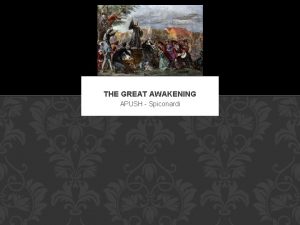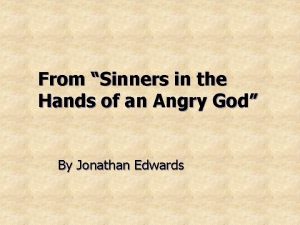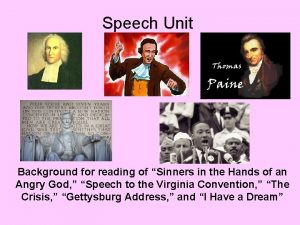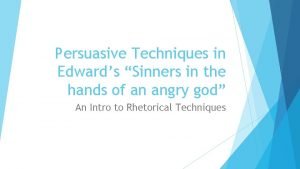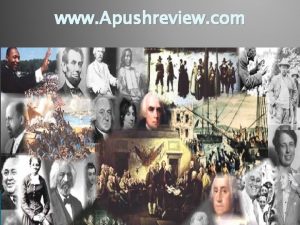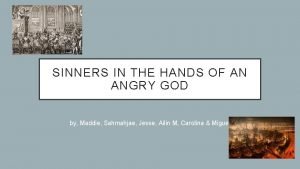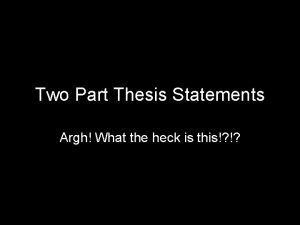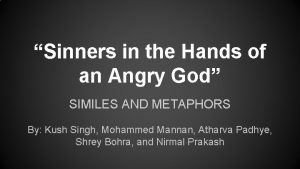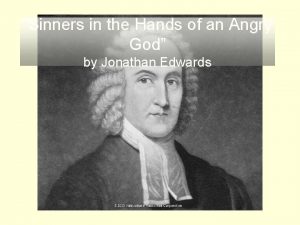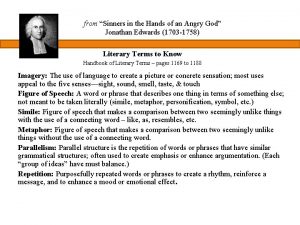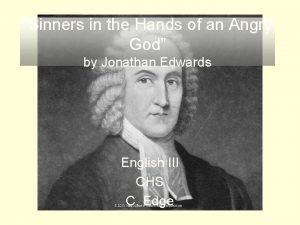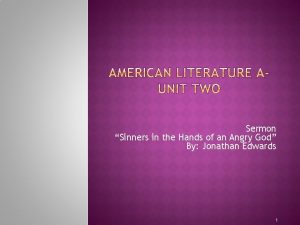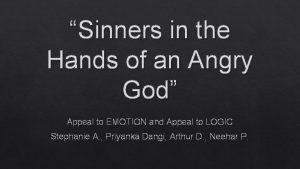From Sinners in the Hands of an Angry









- Slides: 9

From “Sinners in the Hands of an Angry God” By Jonathan Edwards

Literary Focus: Figures of Speech n n Writers use figures of speech to help us see the world in new, imaginative ways. Jonathan Edwards uses figures of speech to help his readers experience the horrors he is describing. – In one memorable example, he describes “wickedness” as being “heavy as lead. ” – By using this simile, Edwards compares the ideas of wickedness to an everyday material his audience is familiar with. – The figure of speech helps them feel the dead weight of wickedness.

Simile, Metaphor, Personification n A simile compares two unlike things, using a word such as like, as, than, or resembles: Her heart is as cold as a dungeon. A metaphor compares two different things without using such words as like or as: Life is a carnival. Personification gives human characteristics to objects, animals, or abstractions: The flowers nodded their heads in agreement.

Reading Skills: Identifying Author’s Purpose n Jonathan Edward’s “Sinners in the Hands of an Angry God” was written with a clear purpose – To make the experience of hell so real and frightening that people in his audience would change their lives. – As you read the selection, circle the details that reveal the author’s purpose.

Finding the Main Idea n n n The main idea is the most important idea in a piece of writing. Main ideas are sometimes, but not always, stated directly. When a writer does not state a main idea, it is up to you to figure it out. You need to use details in the text to infer, or guess, what larger idea the writer is getting at. Listing key words and details as you read can help you to find the main idea.

Into the Sermon n n This is Edward’s most famous sermon which he delivered to a church in Enfield, Connecticut, in 1741. The “natural men” he was trying to reach with his sermon were those in the congregation who had not been “born again. ” – – – They had not accepted Jesus as their savior. Edward’s sermon had a powerful effect Several times he had to ask his shrieking and fainting audience for quiet.

Vocabulary n n n n provoked: v. used as an adj. : angered appease: v. calm; satisfy abate: v. Reduce in amount or intensity fain: adv. Archaic word meaning “happily” or “gladly. ” Mediator: Jesus Christ. In general, one who intervenes between two parties in conflict. forbearance: n. Tolerance, restraint incensed: v. Used as adj. : angered; enraged constitution: n. physical condition contrivance: n. : scheme; plan affections: n. pl. : feelings closets n. pl. : rooms for prayer and meditation. inconceivable: adj. , unimaginable; beyond understanding omnipotent: adj. : all-powerful

Vocabulary abhors: v. : scorns; hates n abominable: adj. : hateful; disgusting n ascribed: v. : regarded as coming from a certain cause. n induce: v. : persuade; force, cause n assunder: adv. : into pieces n

Common Prefixes and Suffixes Con: means “with” or “together” n Omni: means “all” n Able: means “capable of” n Ance: means “state of being” n
 Kate chopin apush
Kate chopin apush Examples of olfactory imagery
Examples of olfactory imagery Sinners in the hands of an angry god main idea
Sinners in the hands of an angry god main idea Alliteration in sinners in the hands of an angry god
Alliteration in sinners in the hands of an angry god What key image does edwards use to persuade his audience
What key image does edwards use to persuade his audience Jonathan edwards apush definition
Jonathan edwards apush definition Sinners in the hands of an angry god summary
Sinners in the hands of an angry god summary Repetition in sinners in the hands of an angry god
Repetition in sinners in the hands of an angry god Sinners in the hands of an angry god thesis statement
Sinners in the hands of an angry god thesis statement Sinners in the hand of an angry god metaphors
Sinners in the hand of an angry god metaphors
